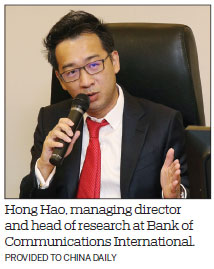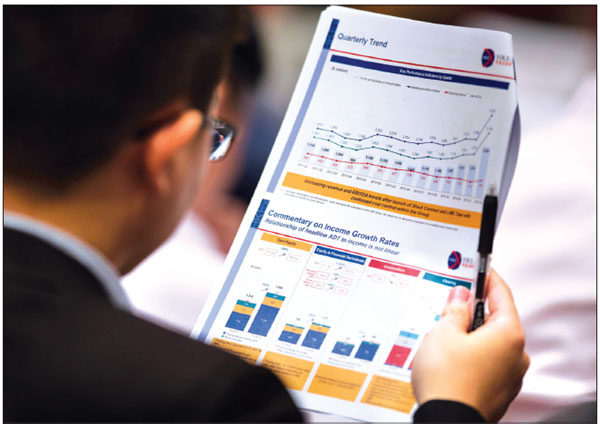'Putting my neck on the line - that's my profession'
Updated: 2019-07-26 07:52
By Luo Weiteng in Hong Kong(HK Edition)
|
|||||||
Financial whizzkid Hong Hao has no fear offending others in going all out for truth
In China's economic-research universe, Hong Hao is a celebrated name.
Bank of Communications International's Hong Kong-based managing director and head of research, who has a reputation for giving honest, sharp views on the country's economy and markets, is one of the most familiar faces in the city's mass media.
His short spiky hair, adding a sharp edge to his appearance, coupled with his insightful observations that never get stuck in a single, rigid type of research, have become noticeable individual characteristics that always set him apart from the others and leave a lasting impression on people when they first meet him.
A good sell-side analyst
What makes a good sell-side analyst? This was the foremost question lingering on the research whiz's mind when his financial career kicked off more than 20 years ago.
"A good sell-side analyst is born to be a loner. He does things in his own way, without much fear of not fitting in. He is by nature a man with an independent mind, always found to be hard to reconcile with other people's attitudes. And he has an innate sense of strong curiosity, which drives him to find out something different," Hong told China Daily, citing the general findings from an analyst survey he did with Morgan Stanley.
Such expressions, by and large, could be seen as a self-portrait of this free-spirited chief strategist. However, Hong pointed out, what sets a good sell-side analyst apart from his counterparts does not lie in his conclusions, but his unique way of thinking, which he uses to notice things that are overlooked by the majority of market players.
Hong believes a good sell-side analyst does not necessarily take the form of a contrarian, always singing a different tune to play to the gallery. "One is unlikely to hold conflicting opinions all the time with the mainstream views," he said. "The point is, the analyst has the courage to hold on to his own views with the backing of thorough research. He also has the guts to admit making an error and move quickly to correct his predictions when predictions show signs of deviating from market reality."
Ever since he entered the profession, Hong has tried "very hard" to be a man of discipline in such a way.
In 2007, when he was an equity analyst at Susquehanna International Group (SIG), Hong issued a surprising "sell" rating on a Shanghai-based hotel chain. At that time, SIG was designated as the co-sponsor of the hotel chain's follow-on offering after the company got listed on the Nasdaq Stock Market in 2006, with its market capitalization shooting up to $1 billion.
For young analysts, it is no easy task to withstand pressure from all sides and strike up a delicate balance between conflicting interests to get one's opinions out there. So it always was, and it still is today, Hong said.
"The issue is, a good company does not necessarily mean it has good stock. Despite robust earnings and strong management, a company with an irrationally high share price could be a stock that investors should stay away from. Our research tries to shed some light on overvaluation and overpricing, hopefully bringing it to a reasonable level," he explained.
Calling himself a "straightforward" person, Hong has no fear of offending others by disagreeing with their opinions, in a belief that truth does not fear contention. "The more the truth is debated, the clearer it becomes."
But he has seen a gradual change of research style over the years.
"In the past, my style was so black and white, all about issuing a 'sell' or 'buy' rating," Hong said. "As my body of knowledge improved, I came to realize that 'sell or buy' and 'right or wrong' may not be the most important issue. What matters is explaining the reasoning process in clear words. The most feared situation, by contrast, is that you are right for the wrong reasons. Next time, you are doomed to doubly suffer from this."
Hong, born and bred in Guangdong province, jokingly described his job as "putting his neck on the line". Strategists and economists play a similar role as fortunetellers, making open predictions under the spotlight on pending highs and lows, crashes and turnarounds, with their "crystal balls".
Known for his laudable predictions on the flash crash of 2010 that caused the New York Stock Exchange's biggest stock plunge in decades, the unprecedented liquidity crisis and corresponding turnaround in China's stock market in 2013, as well as the historic boom-to-bust cycle on Chinese stocks in 2015, Hong has risen to fame as "China's most accurate strategist" as named by Bloomberg, and the No 1 China Strategist and No 1 economist in Asiamoney's survey in 2017.
Despite all the fame, Hong said his most-cherished appraisal is that from an editor-in-chief who acclaimed his works as the only research reports whose key takeaways cannot be automatically fetched by a computer system, but must be edited by human beings.

Over the past years, global investment banks cut thousands of analyst jobs in the wake of the EU's new financial market regulations, commonly known as MiFID II, and the sheer power of artificial intelligence technology makes once-highly paid positions replaceable. Hong believed the sell-side research should become the most valuable thing that investment banks can offer to clients in their quest to stand out from the competition.
Where does the value come from? To be sure, those research papers written in a dull, mechanical and stereotyped writing style will only be buried in a mountain of homogeneous reports landing in clients' email boxes every day, Hong warned.
According to a report from the CFA Institute, "research analyst" is on the list of the three investment professions that are most likely to be phased out in five to 10 years' time. The report, conducted over the first three months of the year, surveyed 3,832 respondents in Hong Kong, Macao, Taiwan and on the Chinese mainland.
As an industry shakeout looms ahead, Hong said the value of insightful mind come into special focus. For analysts, research papers set the stage to articulate their unique ideas and build a solid relationship with readers. Such an entrenched relationship cannot be taken over by technology-driven machines or systems.
Untypical career path
Though making a mark in China as a macro strategist, Hong's career story, with elements of serendipity and coincidence, began as he started his Australia expedition as a student with just a box of instant noodles. Yet he eventually landed a plum job as an equity analyst in Australia's biggest investment bank, Macquarie.
Several years later, he was offered a transfer to the macro research division. This was followed by his journey back home at the invitation of China International Capital Corp in 2009 as a global strategist. At that time, he deemed returning home to work an "approximately right" opportunity.
In the investment profession, there is no shortage of wise minds getting lost in the pursuit of life goals with their talents buried and wasted. Hong said he is truly a "lucky dog", taking a career path far from typical.
"Looking back on it, I wouldn't have been able to go very far if I moved back home to do equity research, as everything had to be started from scratch," Hong said.
Though good luck is an important factor, hard work and diligence are also indispensable. A former chief financial officer of a Nasdaq-listed company left a comment on Hong's personal blog, recalling an equity analyst from SIG that visited his company to do research. The "interesting guy", with long hair and round glasses, reminded him of John Lennon. The "gift" he received from the analyst was being added to the "John Lennon's" email list and being bombarded with research reports.
But the research papers caught the CFO's attention. In a report on a milk powder company, the analyst included photos of supermarket shelves to show the place and amount of the branded milk powder put on the shelves. The "interesting guy" who wrote the report was Hong.
The self-disciplined strategist believes the charm of his job lies in continuous learning.
"It is a profession where you get paid to learn instead of paying tuition to learn," he said. "The profession builds a bridge between the ivory towers and the markets. It can be defined as a discipline more practical than applied economics. This is what our profession could contribute to the society."
sophia@chinadailyhk.com
|
An analyst reads a brochure from the Hong Kong Exchanges and Clearing Ltd. Jerome Favre / Bloomberg |
(HK Edition 07/26/2019 page6)
